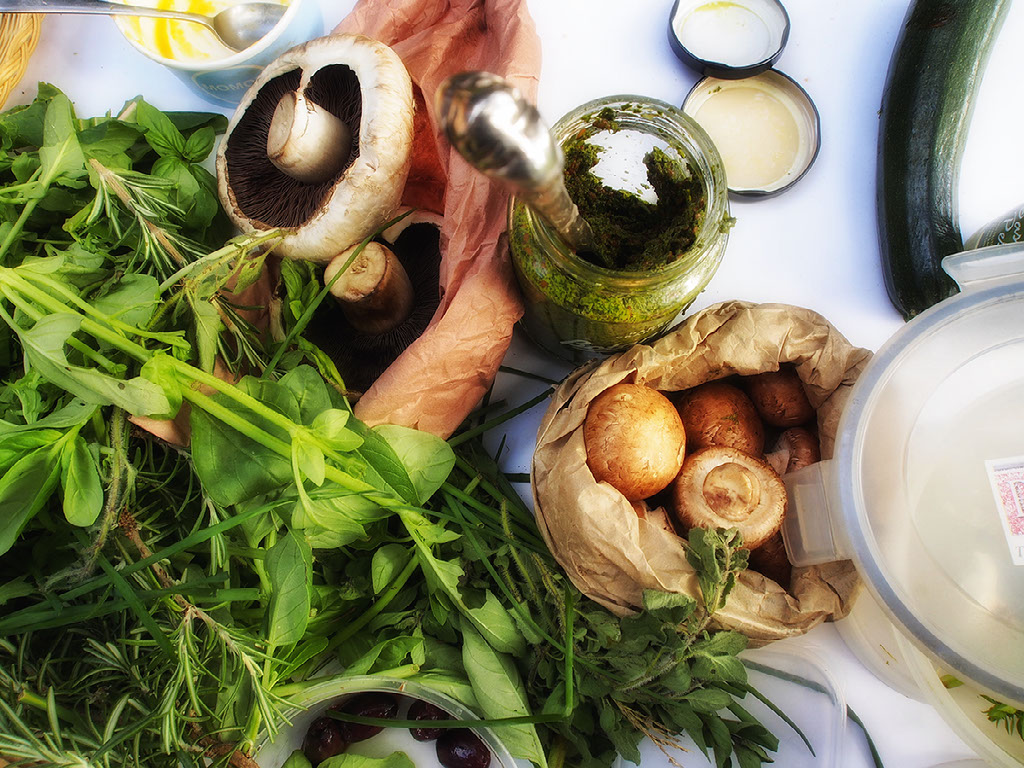A day in a permaculture jungle International Permaculture Day 2016 at Silk Farm
Above: Co-organiser of the Permaculture and Development mini-conference, April Sampson-Kelly, with Russ Grayson (obviously amused by someone), author of this report.
FIRST, a note of personal thanks…
HERE IS a big public thanks to April Sampson-Kelly and Terry Leahy for organising the Development and Permaculture mini-conference for International Permaculture Day 2016.
And here is a big hug of appreciation for the crew I drove from Sydney to the event with... that svelte and also most-capable driver, Virginia Littlejohn; worm science expert/caterer/all-round food expert, Liane Colwell; Ian, displaced from the swells of the far north coast; the smart Cecilia Macauley who so tastefully applies permaculture design principles to the organisation of the home.
I'm unsure if the journey to Silk Farm, on the slopes of Mt Kembla on the NSW South Coast, was the 'car party' Liane said it would be, however with that crew it was certainly a convivial way to travel.
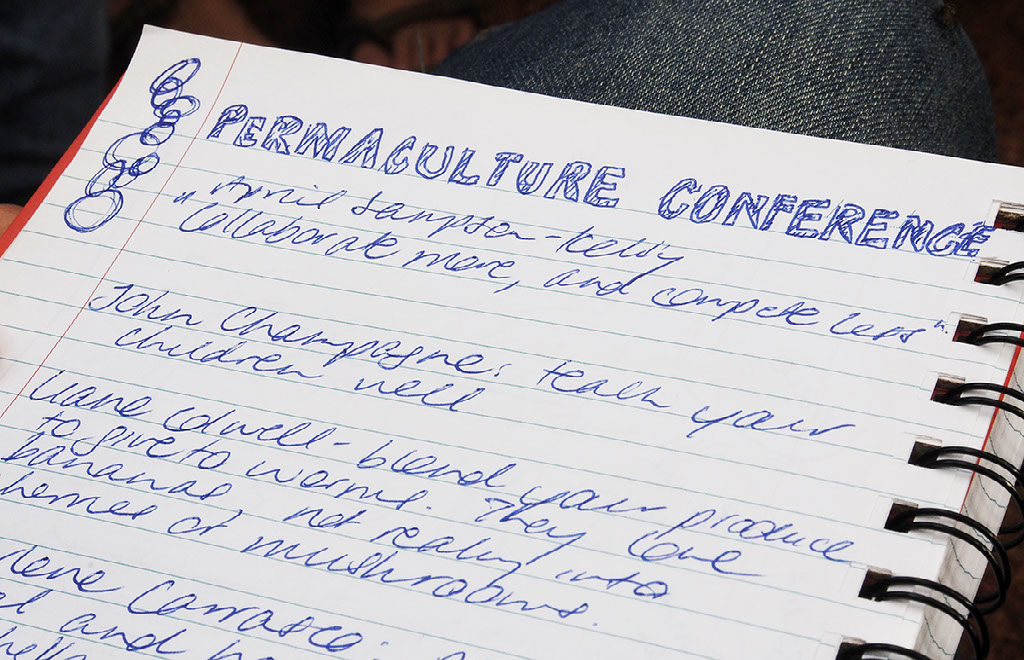
NOW, the story…
IF BUZZ is a word to describe the energy and ambience generated by people at an event, then there was plenty of it at the Permaculture and Development Mini-conference at April Sampson-Kelly's Silk Farm at Mt Kembla.
April is fortunate enough to live on a 2.5ha lot in Mt Kembla village, a small enclave amid the forest of the Illawarra escarpment below which the flatlands open up all the way to distant Port Kembla and Wollongong, the major city here on the NSW south coast. I think of April in her rambling house as living in her own forest, for that is what her permaculture property is, a forest of species selected for their yields as per the permaculture design principle of 'obtain a yield'.
I didn't make a head count but there must have been around 40 present this International Permaculture Day. The event had sold out. It was full house in April's room under her rambling timber house amid her permaculture jungle through which an assortment of chooks roamed.
Newcastle University lecturer Terry Leahy, brother to filmmaker Gillian Leahy (who has had some involvement in the food forest project in the Whites Creek parklands in inner urban Annandale in Sydney), opened the event.
Terry is also involved in intentional development and authored the book Permaculture Strategy for the South African Villages (2009). He and Gillian teamed up to produce the video, The Chikukwa Project, about the implementation of permaculture in an African community in remote Zimbabwe.
Terry spoke of the 'gift economy', an alternative to the mainstream economy with its periodic crises.
…the gift economy includes non-monetary transactions, and elements of it are found in our present day institutions…
Terry said that the gift economy includes non-monetary transactions, and elements of it are found in our present day institutions. This creates hybrid structures combining elements of the gift and capitalist economies. Spain's Mondragon Co-operatives, which are manufacturing workers' co-operatives and which includes its own bank, is an example.
With April Sampson-Kelly, Terry was co-organiser of the day.
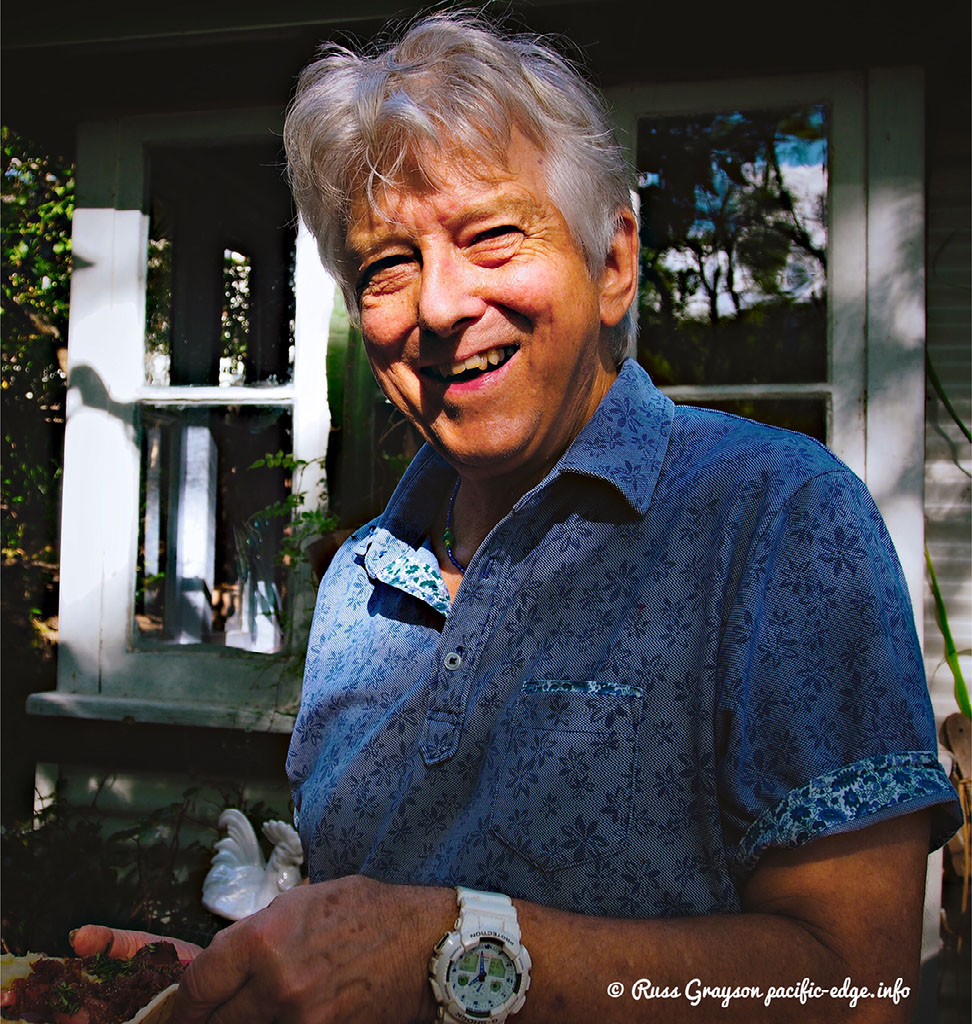
Teach your children well
April started off the five-minute talks following Terry's presentation, and I followed. Here's a few highlights from those talks...
Robyn Rosenfeldt is a NSW South coast woman who took the daring gamble of launching a print magazine a couple years ago.
She said that her motivation in starting PIP, Australia's permaculture magazine, was to take permaculture to those who might not be touched by it, to take it into mainstream Australia, to make the design system accessible. PIP's mission is to make permaculture attactive.
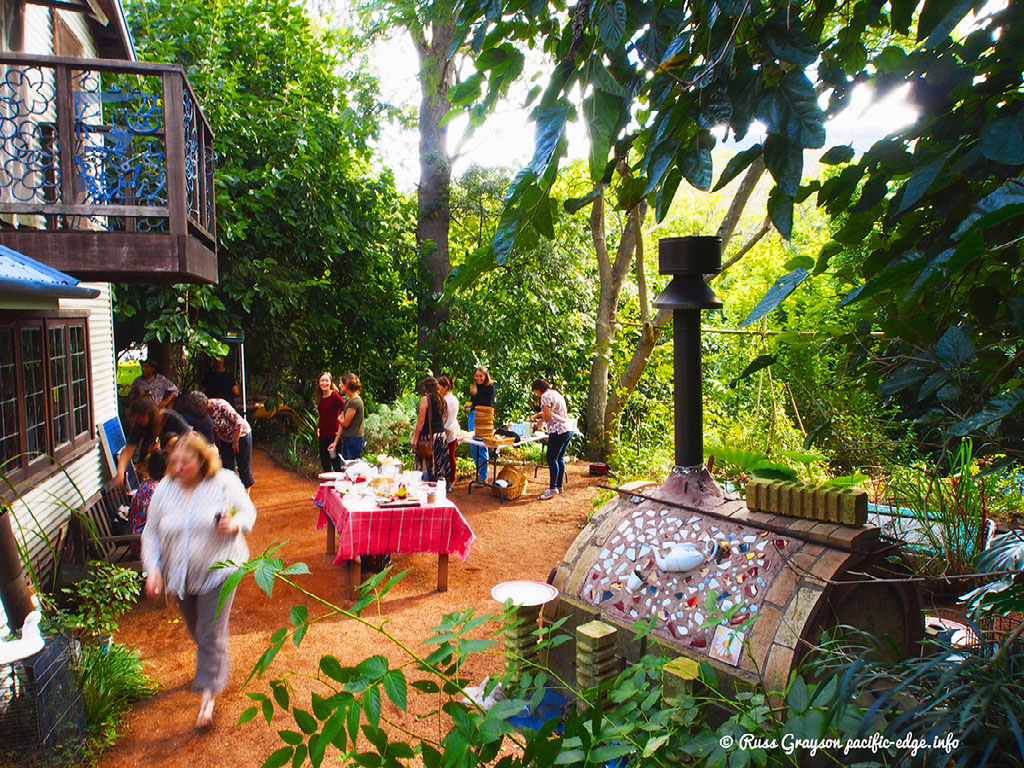
Cherryl, Jacki, Beck and Christy are the face of permaculture's new generation and are evidence that intergenerational change is happening in permaculture.
Graduates of Aaron Sorensen and colleague's permaculture design course in the Illawarra district of the NSW South Coast, the four young women wondered what they would do after the course finished. Their focus now is waste education and Permablitz, a participatory home garden makeover scheme.
That question they asked is one asked by many others, signifying the need for a post-course path into the practical application of the design system. The question stimulated later discussion around the need for the mentoring of people coming out of permaculture courses.
Children absorb how families live and the ethics they live by…
John Champagne, who has been teaching permaculture design on his Brogo Permaculture smallholding in the Bega Valley of southern NSW for more than 20 years, said how the best part of the permaculture lifestyle that his family adopted has been the children they raised, one of whom has become a music performer.
Children absorb how families live and the ethics they live by, John said, referring to the Crosby, Stills, Nash & Young song, 'Teach your children well' as a good idea.
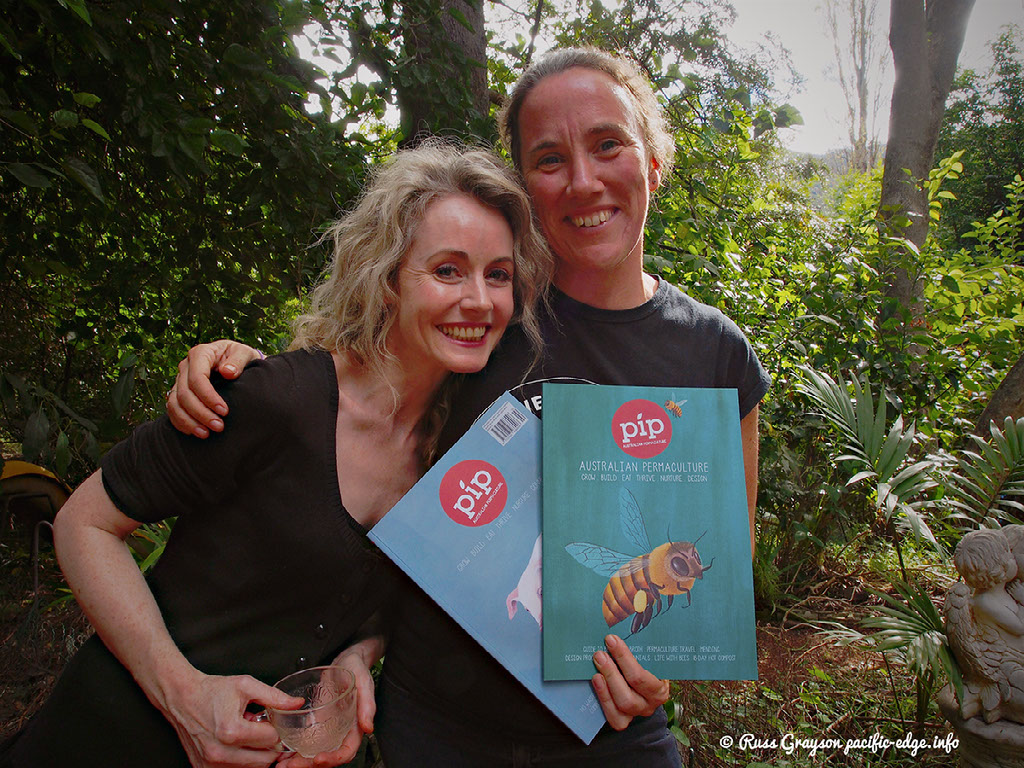
Peter Brandis is a tall man, his head shaven and with the build of someone who works the land. He is a smallholder from Kangaroo Valley in southern NSW, has experience in NGO work and is president of the Kangaroo Valley Community Garden which he sees as a component of a larger move to build the local economy. He defended subsistence production which, he explained, was destroyed by capitalist economies.
We could describe Liane Colwell as a black hat woman because a big black hat is what she wore this day. That's not to suggest her personality is an any way negative because the opposite is true as we learned when she described how she has created a sense of community among residents of her 15th floor apartment building in inner urban Sydney. Up there, she shares food and other stuff and organises informal get-togethers.
A caterer, cook and an expert on worms and their farming (Leanne did her university course research project on worms, their biology and keeping), Leanne kept me and the others I drove to the event with entertained and informed with a discussion of phytonutrients (yep, well out of my mental territory).
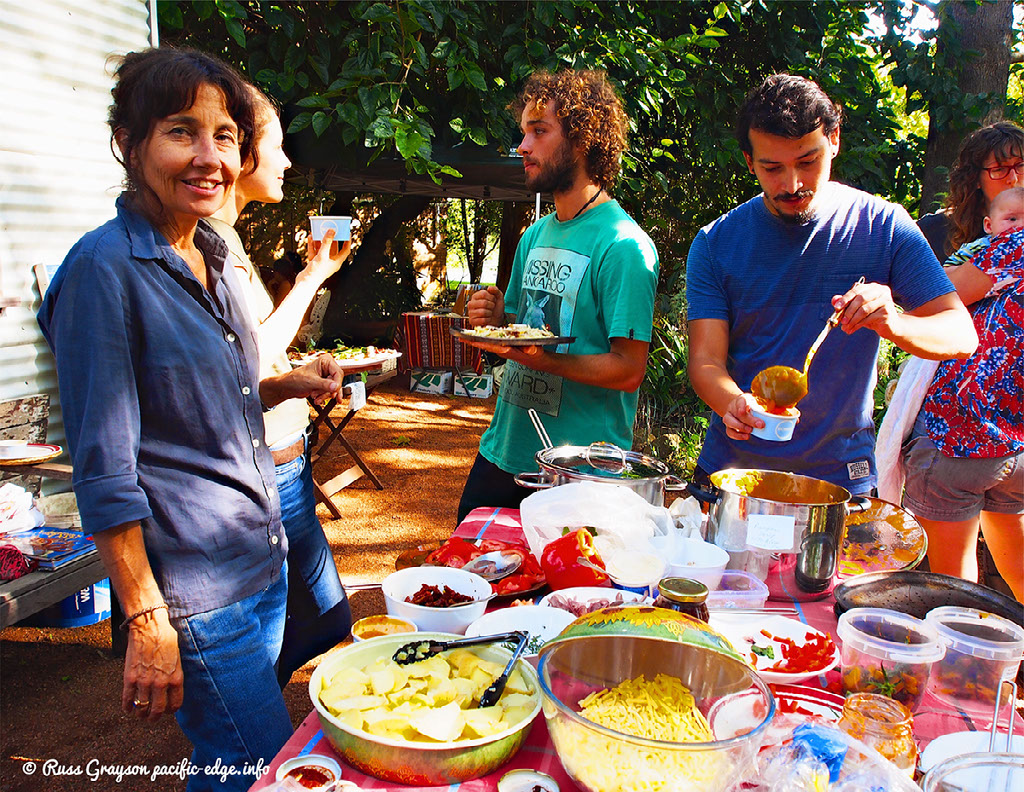
You have got to believe you can carry out your dream...
Marlene Carasco's story was one of healing after personal crisis and how discovering Permaculture Sydney West has helped her heal and led to involvement in permaculture design in schools.
You have got to believe you can carry out your dream, she told the audience. She and others have been asked to think about a whole-school permaculture-based curriculum by a western Sydney high school.
A social worker by trade with experience of working with refugees, Marlene's story was emotionally touching.
Aaron Sorensen is teacher-trained and the opposite to Malene in build. Tall, muscular in the way that gardeners get through working in their garden-gyms and with a mop of dreadlocked, reddish-brown hair, Aaron has for years taught permaculture design in the Illawarra region, worked with people to start community food gardens and, with local landscape architect Dan Deighton, worked on land rehabilitation projects to restore industrial land for the local steelworks.
He and Dan now work with 17 Illawarra schools in food gardening and food preparation and in demonstrating how to include gardens as part of school curricula.
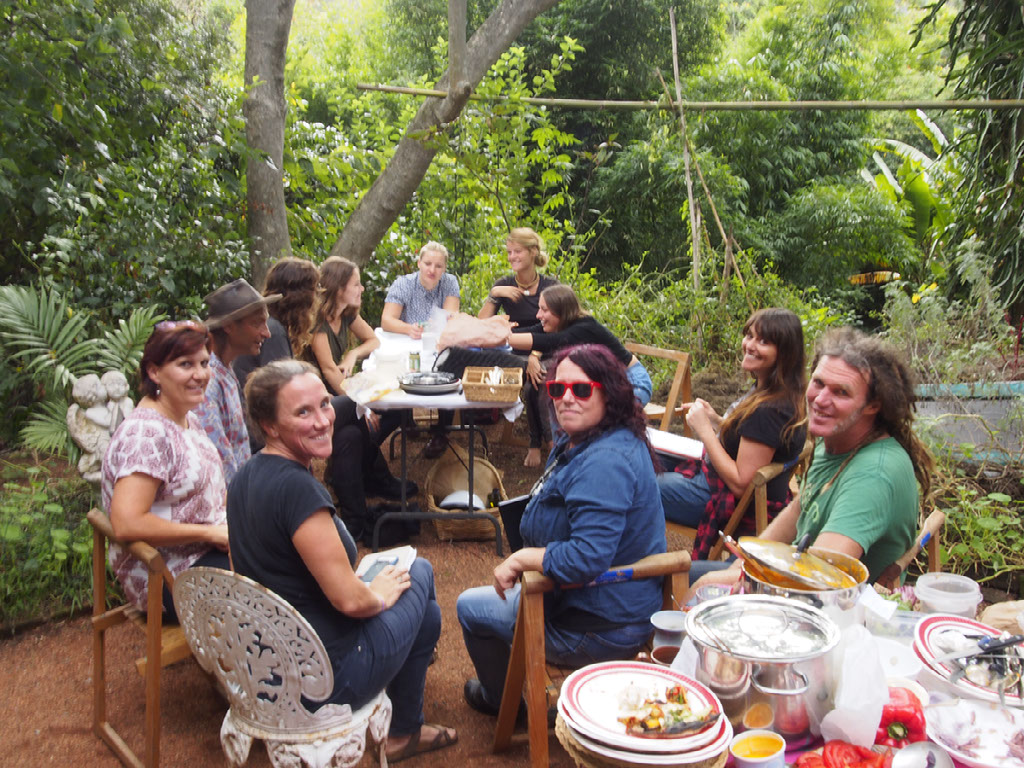
While we're thinking about the physical appearance of people doing their five-minute mini-talks we can't go past Cecilia Macauley.
Whereas Aaron and Peter have the appearance of hard working men-of-the-farm-field, Cecilia is elegance. And unlike some of us, the world of the hair dresser is not another planet to her.
Daughter of a farming family who started her first vegetable garden when she was nine, Cecilia spends time in Japan as well as in her Annandale share house where WWOOFERs (Willing Workers on Organic Farms, a long-running, national work exchange farmstay program) do much of the work. She says that people growing food in Australia do not do so out of necessity.
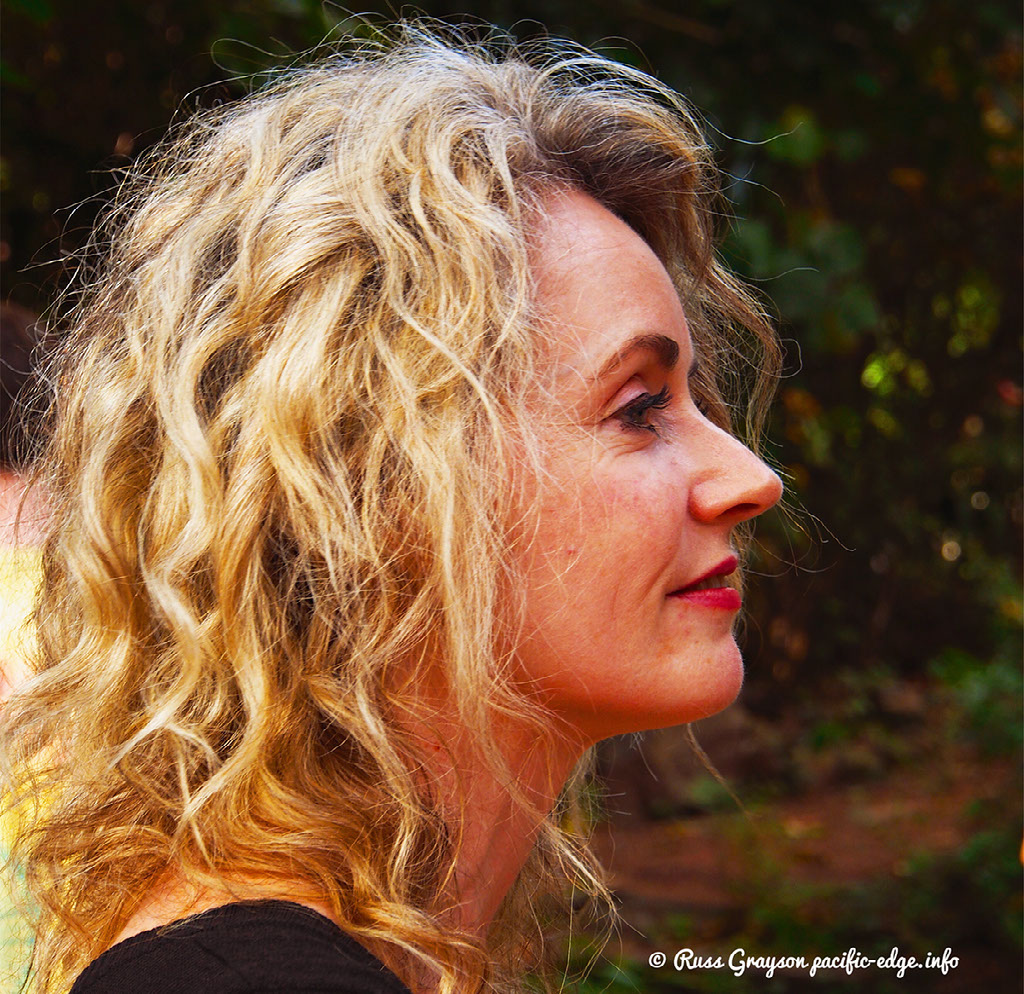
Cecilia's is a unique angle of permaculture and I suspect the influence of Japanese culture and a sense of Japanese aesthetics have much to do with her using the permaculture design system's principles for household management and in helping people reduce the clutter, the amount of stuff they live with.
Her approach — using design as the basis for the organisation of personal space — seems to combine both the physical management of domestic space and the mental management of psychological space.
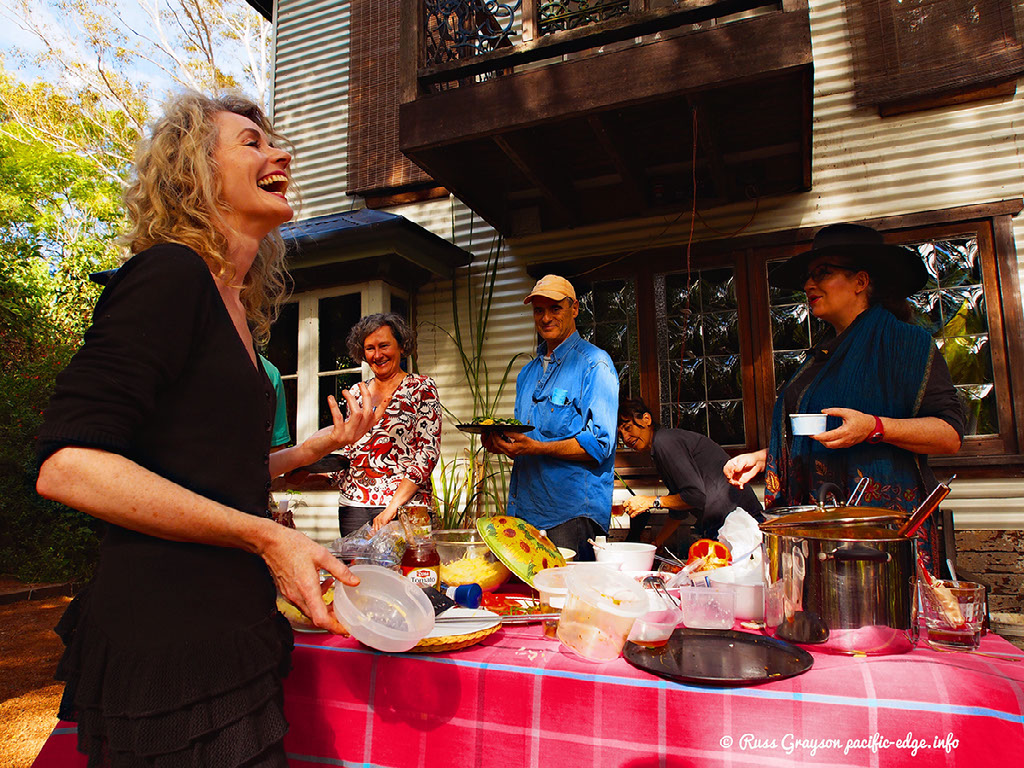
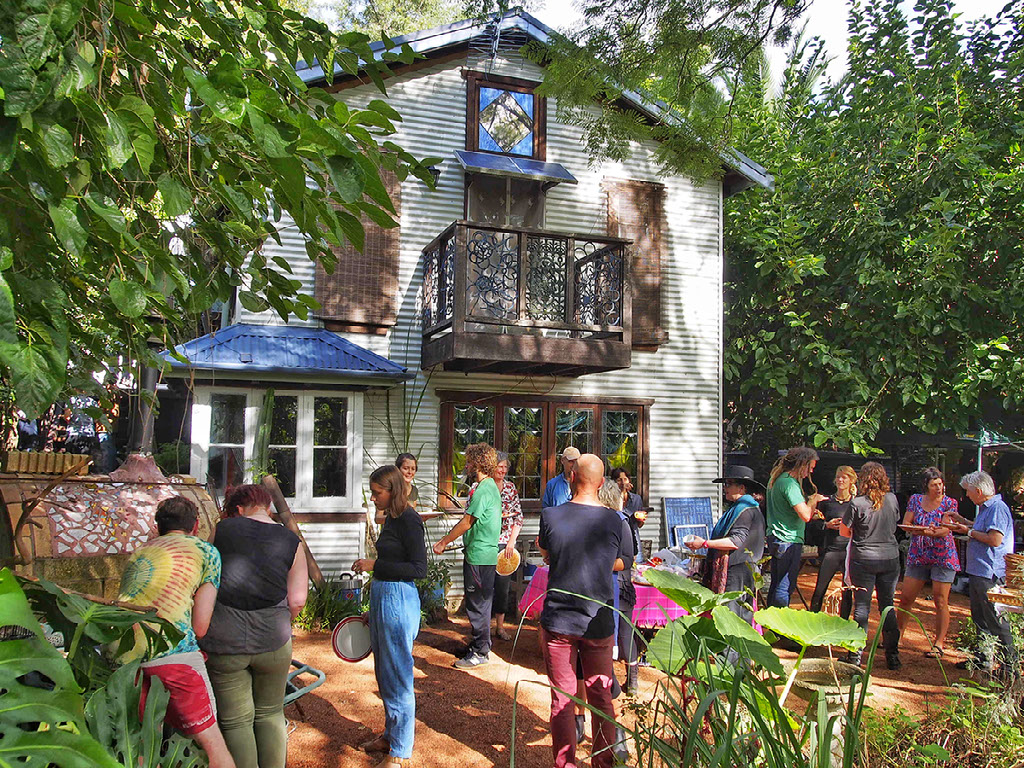
The questions
We broke into four groups to discuss four questions and report our finding back to the entire group after lunch. But, first, lunch. And what a lunch, with the contributions people brought and what April supplied.
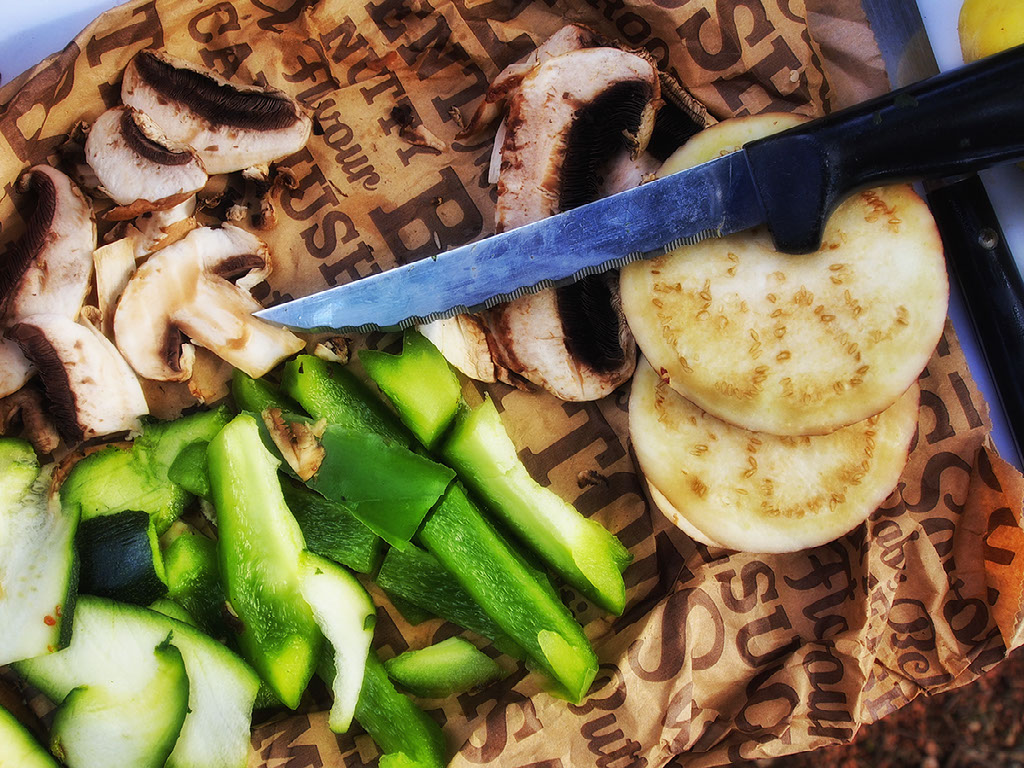
The menu: pizza cooked in April's wood-fired pizza oven, something of a work of art in itself (I should have mentioned that April is an artist too). And here, thanks to the kindness of Virginia Littlejohn, a rehabilitation physiotherapist and all-round, all-capable woman from Sydney, I tried my first cup of kumbucha brew.
Those four questions we took to our World Cafe style table conversations included:
1. What would be the difficulties with the gift economy?
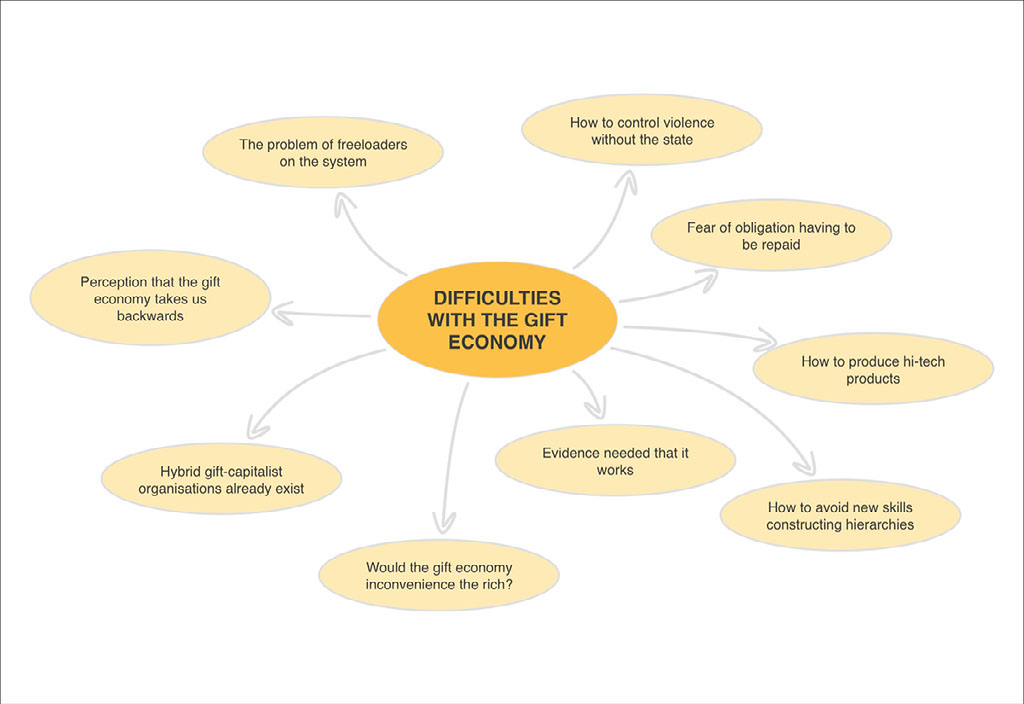
2. What are some organisations operating as hybrid gift-capitalist economy entities?
3. How do we make permaculture more mainstream?
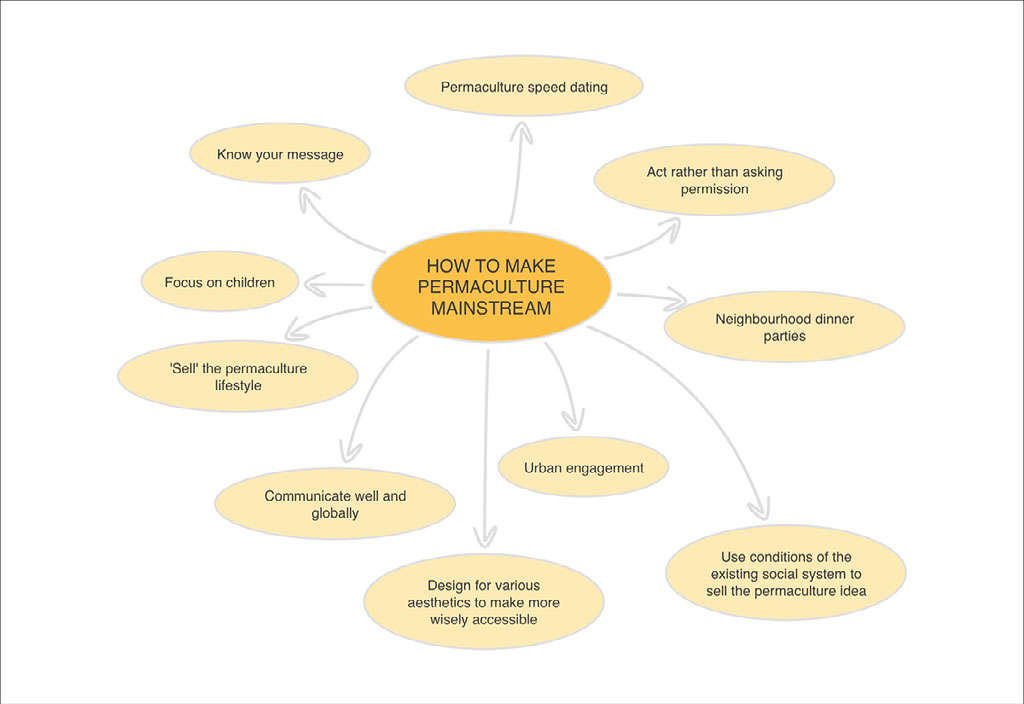
4. Why are permaculture practitioners such go-it-alone lone wolves?
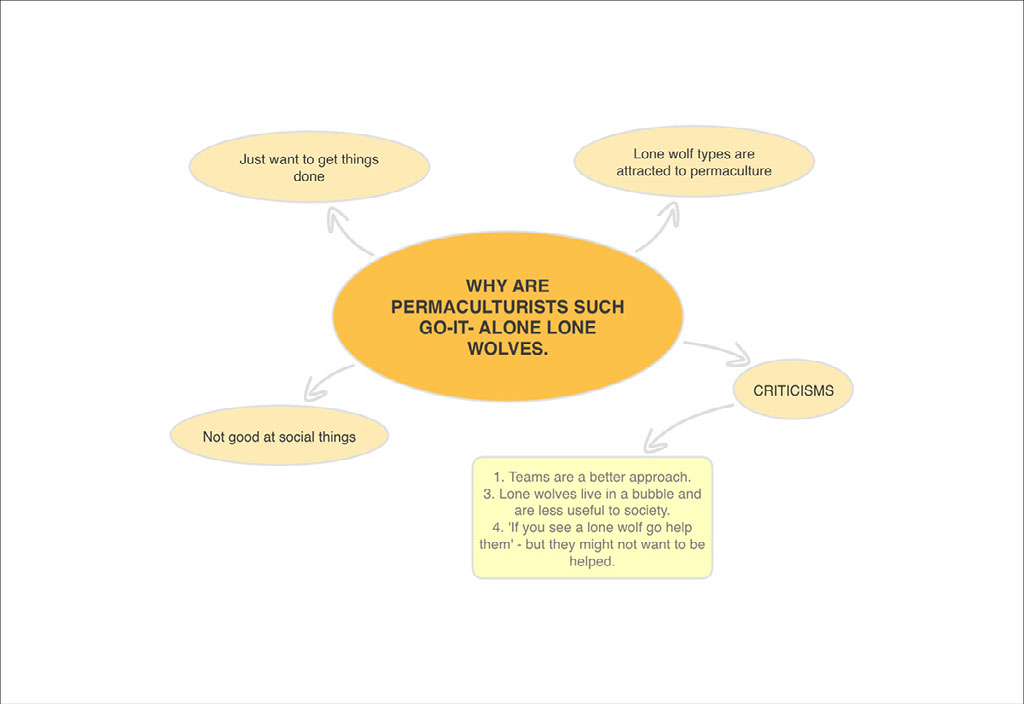
The buzz
Let me return to the buzz I mentioned at the start. That certainly was there this fine and warm, mid-Autumn day there in the forest April and family call home here in this little village on the side of a mountain. The buzz was the product of having all those creative, imaginative permaculture people together in one place.
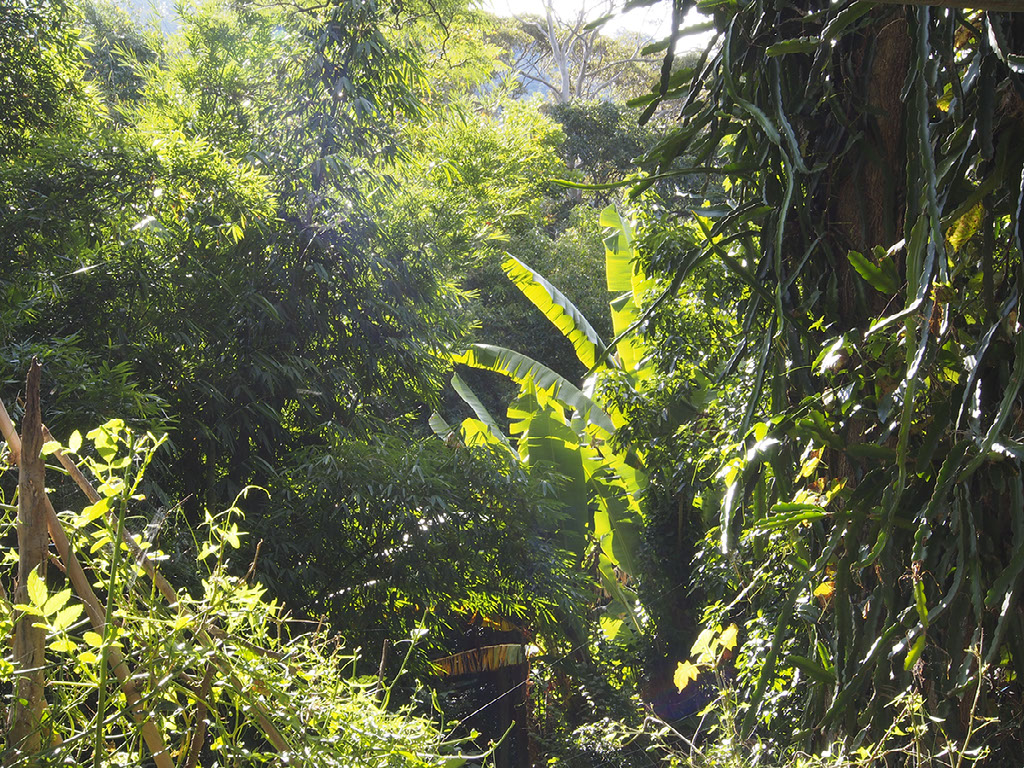
That question of lone wolves in permaculture... here's an admission. In getting the website and social media for International Permaculture Day 2016 up so that people around the world could make the Day happen, Fiona Campbell and I acted as those lone wolves the topic of discussion that one of the tables focused on. We don't want it to be this way and will be looking at how we assemble a global band of permaculture people to take the Day forward in future.
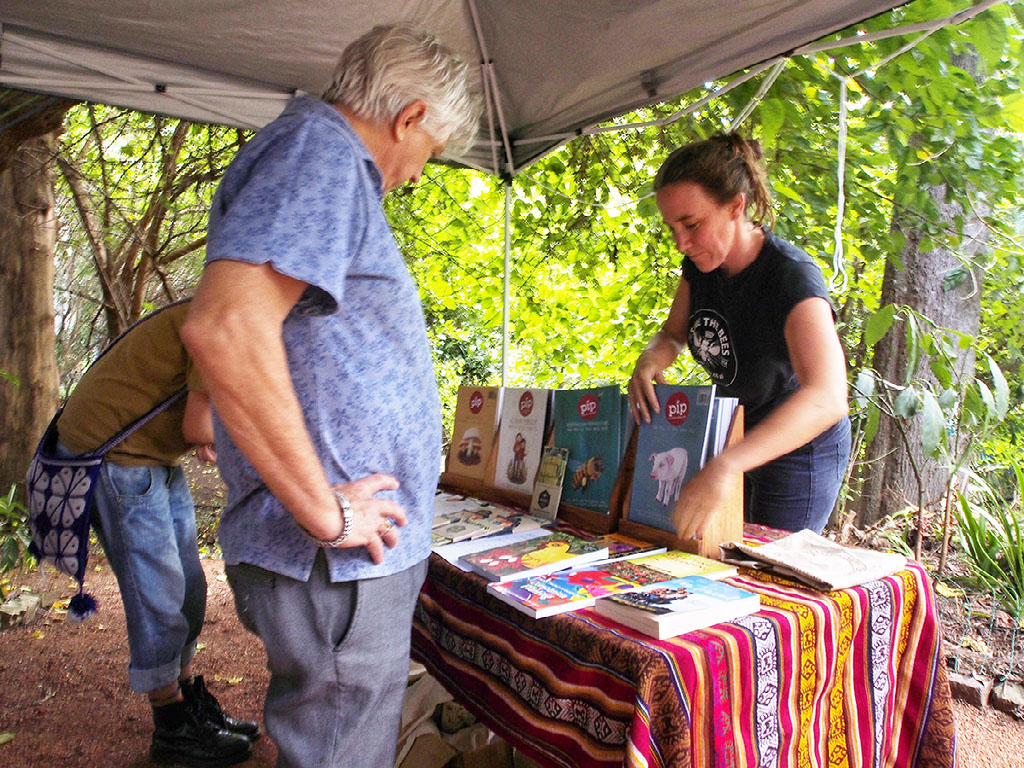
International Permaculture Day started an an Australian event seven years ago and just a few years after that it spread to become an international day of celebration of the permaculture design system.
The fact that we had only two and a half weeks to get the website live and encourage the more than 50 events listed is evidence that people want International Permaculture Day to continue.
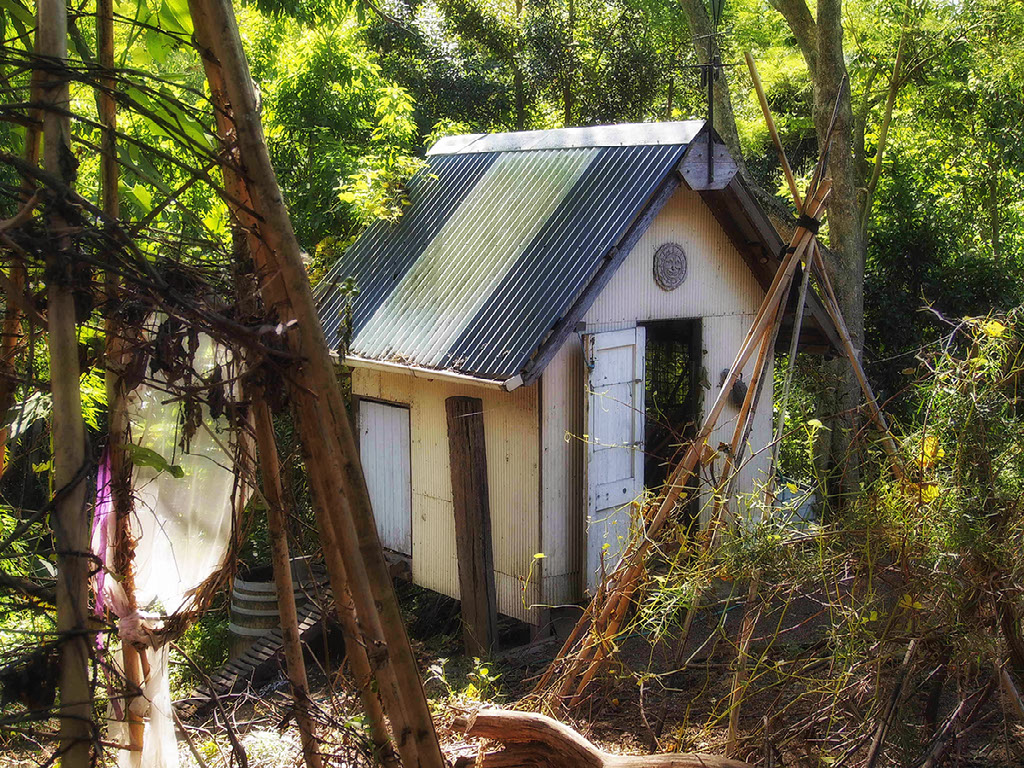
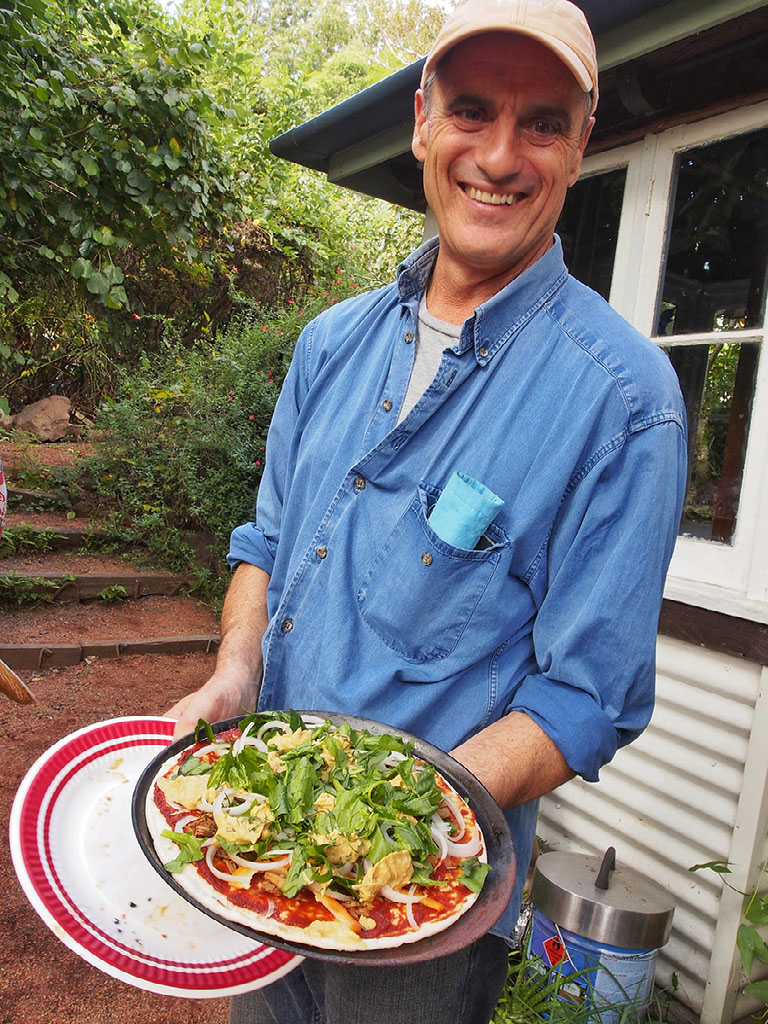
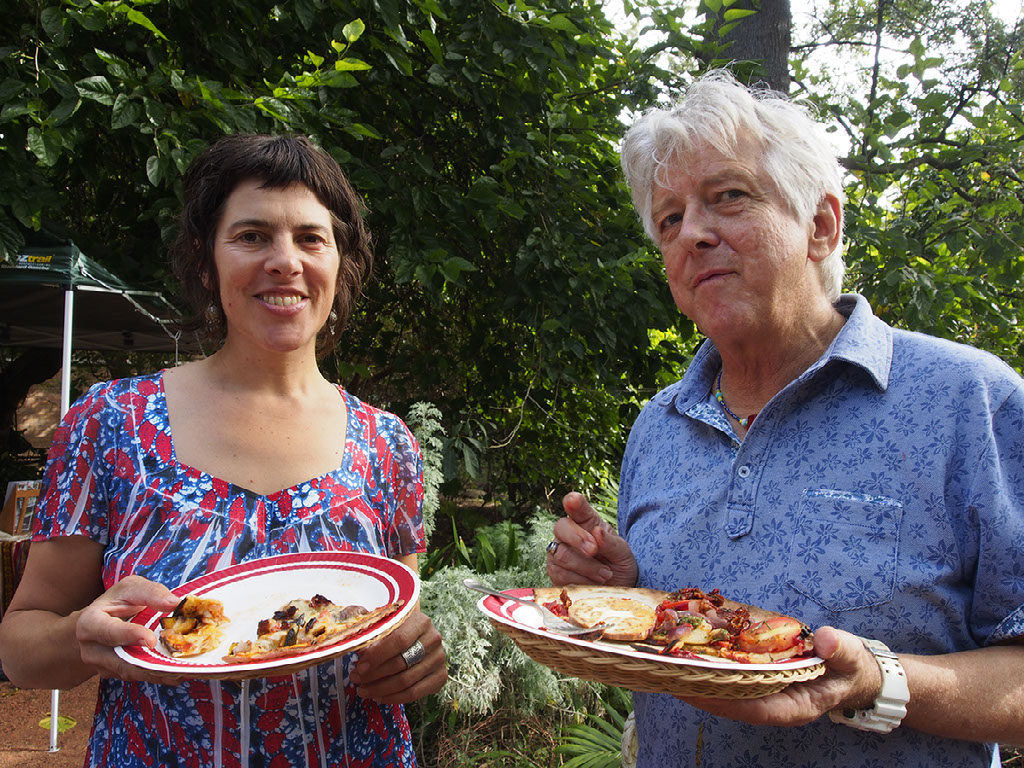
International Permaculture Day events around the world…
AUSTRALIA:
Permaculture Central Coast at Gosford Show, Gosford, NSW
Djanbung Gardens Permaculture – open garden, Nimbin, NSW
Permaculture design at the Randwick Sustainability Hub
Randwick Community Centre, NSW
Polyfaces— the movie. Randwick Community Centre, NSW
Gippsland Permaculture Convergence 2016
Glengarry, Victoria.
NEW ZEALAND:
Aotearoa/New Zealand National hui.
ASIA:
Introduction to Permaculture, Bidakanne village, Jharasangam mandal, Medak district, Andhra Pradesh, India
International Permaculture Day Chiang Mai, Cool Guest House, Chiang Mai, Thailand
Permaculture celebration, Ulaanbaatar, Улаанбаатар, Монгол Улс
IPD – Yogyakarta. Imogiri, Bantul Regency, Special Region of Yogyakarta, Indonesia
IPD in Ubud, Bali, Mahardhika Kebun Organik, Peliatan, Gianyar, Bali, Indonesia.
CANADA:
Introduction to Permaculture – Central Alberta
Red Deer, AB, Canada
Front Yard Permablitz, Saskatoon, SK, Canada.
CENTRAL AMERICA:
Taller de bombas de vida. Santa Ursula Foodtruck, Santa Ursula, Santa Úrsula Xitla, Mexico City, Mexico.
Permacultura en México, Callejón Durango 6, Roma Norte, Mexico City, Mexico.
EUROPE and adjacent:
International Permaculture Day celebration, Garden Cottage, Lees Stables, Kelso Road, Coldstream, Berkwickshire, Scotland, TD12 4LF, United Kingdom
Aquaponie en Permaculture, 2 Rue des Iris, Saint-Florent-sur-Cher, France
Permakültür Nedir?, İNCİRLİ CAD. NO:6 AKBULUT İŞ MERKEZİ KAT:4 DAİRE:114 BAKIRKÖY - İSTANBUL
Dünya Permakültür Günü Kutlaması ve Bahçe Çalışması, Hobi Bahcesi. Küçükçekmece Belediyesi, Turkey
La Terra ci sostiene – prendiamocene cura con la Permacultura, Via Don A. Pogolotto 45, Giaveno, Metropolitan City of Turin, Italy.
USA:
Albany Arts & Green Festival. Memorial Park, Albany, California
4th Annual Permaculture Day Free Talk and Tour of Permaculture Homestead, Tennessee
Our Global Family Work Day, San Luis Obispo, California
Permaculture & the Climate Crisis: Science, Politics & Practice, Santa Barbara, California
IPD Permablitz Garden Barn Raising in Utah, West Jordan Utah.
Read the International Permaculture Day 2016 blog: permacultureday.org
